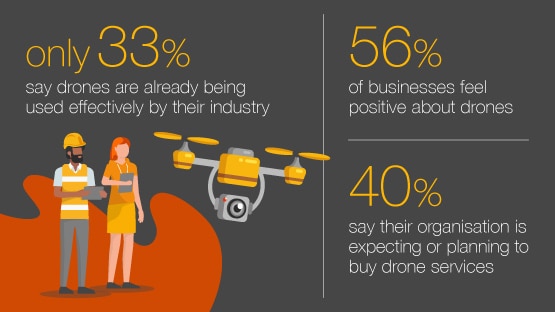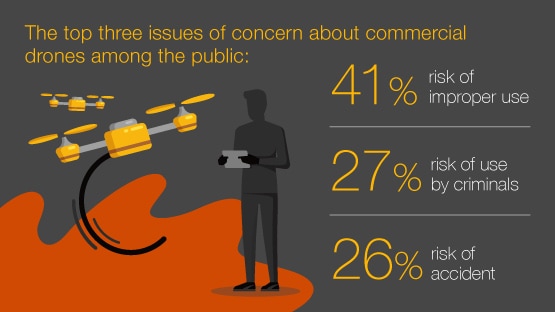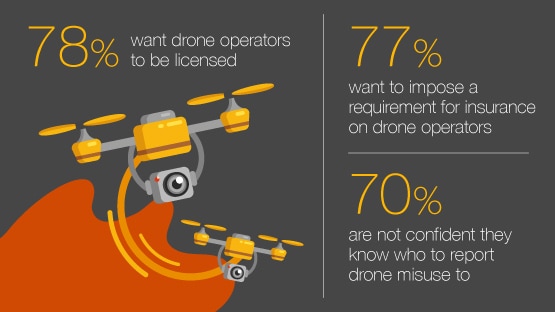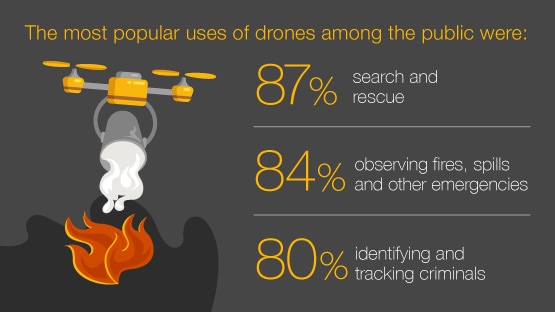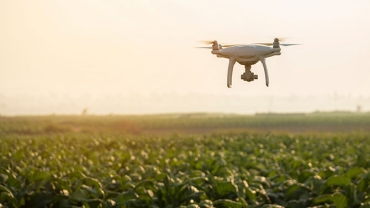
Drone technology presents an unprecedented opportunity for businesses and society. Some examples of the application of drone technology are drones for road traffic management to reduce traffic on our roads, speed up the delivery of humanitarian aid and carry urgent medical supplies, there is no limit to the use of drones. Drones are already proving an excellent tool for businesses who are using drones for asset inspection to better manage and maintain their assets and reduce the amount of working at height. Environments which were initially hostile or inaccessible are becoming accessible through the use of search and rescue drones, relaying images and data, bringing new capabilities to sectors such as emergency services, academia and the scientific community.
‘Amazing but scary’
But to deliver on the promise of drones, it is important the public is on-side and businesses see and understand the potential. To achieve these goals there are some hurdles to overcome.
PwC research into public and business attitudes towards drones has revealed less than a third (31%) of the UK public currently feel positive towards drone technology.
Our research also found many people are unsure and waiting to be convinced. Others admit they simply don’t know enough about the technology. One member of the public described drones as “amazing but scary”. A business respondent said they are “not sure what [drones] are capable of doing”.
Public and business trust is there to be won. But to do so requires three factors to be addressed: Education, Accountability and Reward and benefit. It is human nature that we trust things more when we understand them, when we know who to contact if something goes wrong, and we know what’s in it for us.
Compare yourself against our survey data:
Education: How are drones used in today’s society?
In order for the public and businesses to trust drones it is essential people understand them and their uses, the rules in place that govern them and the ways in which they will benefit society.
Some public respondents to our research were quick to dismiss drones as “a dangerous nuisance”, while others regard them as “a toy”. One called them “a needless use of technology whose only purpose seems to be spying and interfering with aircraft”.
But while a third of the public (31%) already feel positive towards drones almost half (48%) are undecided. Among business respondents, 53% believe there is not a wide enough understanding of drones, which means they are often not considered.
“The possibilities are endless”
“Drones could be more of a nuisance than a benefit”
We know from consumer attitudes towards past emerging technologies that among the 21% who feel negatively towards drones there are some who may never be turned, but education has a vital role to play in building consumer trust and addressing concerns raised in our research; from privacy to noise pollution.
Public discussion around drones over the past year has been dominated by the high profile disruption at Gatwick Airport, which many respondents referenced when asked about their attitudes to drones. Nearly two-thirds (65%) of the public believe the Gatwick incident has negatively influenced how they think about drones.
For businesses, education also extends to finding out more about drone operators and their offerings. More than half (52%) of business respondents to our survey agreed more drone services would be used if there were more service providers with a credible offering.
Accountability: Who is responsible for governing drone use?
From buying medicine to applying for a loan, people tend to feel more trusting of something that is well regulated.
When the UK’s ‘Well Driven?’ campaign was launched in the 1990s, putting phone numbers on the backs of lorries so road users could report bad driving, the intention was to encourage lorry drivers to drive more considerately, while giving the public confidence that there was additional accountability for hauliers beyond the usual laws of the road.
To win over public and business trust in drones, people need to feel drone operators are subject to regulation and there is accountability in place.
One business respondent told us they believe drones are “just dangerous until properly regulated” and concerns about regulation may be holding back adoption. Perhaps wary of taking on unknown risks or inviting future legal issues upon themselves, more than 50% of business respondents said introduction of industry-specific qualifications would help drive adoption. Rules do exist, but public awareness is low. Our research found only 4% of respondents feel very familiar with the current Civil Aviation Authority (CAA) rules governing drone use. Understandably many people still need convincing that responsibility can be encouraged and enforced.
“Drones could do a lot of good for us all as long as they are used in a responsible way."
Reward and benefit: What are the benefits of using drones
The PwC research found public opposition to drones reduces when people are presented with specific, beneficial use cases of drones. Importantly it is not always about a benefit to the individual. In fact, uses with a wider benefit to society scored most highly, especially those related to health and safety.
These findings suggest the public will warm to drones if they see the clear benefits drones can deliver.
For businesses seeing drones in action and the benefits they can deliver seems especially compelling. Among business respondents to our survey, 50% believe increased drone use will bring significant economic benefits to the UK. But among businesses who already use drones more than 90% believe they are already delivering an array of benefits. For example, at PwC, we completed our first stock count audit using drones in 2018 with the objective of improving the quality of our audits.
“You are able to use drones to achieve results that would be very expensive to achieve other ways.”
“They are a great innovation and have the ability to revolutionise the way we live.”
“They could be a force for good.”
However, favour is often more complex to win with the public than with businesses. Simply proving a use case does not guarantee public favour. Some uses of drones leave the public unconvinced, particularly those that are ‘too close to home’. Other concerns range from the level of drone traffic in residential neighbourhoods to drones replacing people in certain jobs. Opposition to the delivery of packages in particular highlights the work to be done by businesses and drone operators to win over consumers. While speed of delivery may increase convenience, such a benefit may still appear to have its downsides. While some of us may want our own deliveries to come quickly by drone, do we really want our neighbours to receive such deliveries, especially if our neighbour is a serial online shopper? We’ve probably all gladly taken in a package or two for a neighbour, but whether we’d feel so magnanimous when next door’s drone deliveries start turning up and buzzing over our garden is another matter.
However, businesses shouldn’t shy away from public concerns, and allow an information vacuum to be filled with negative perceptions. Industries that stand to benefit need to get on the front foot, understand how they can benefit from drones and think about how they convey benefits to consumers.
Research methodology:
The research was carried out during April 2019 by Opinium. It surveyed 1,520 UK adults, sampled and weighted to be representative of the UK adult population, and 252 senior business decision makers in sectors likely to see increased drone usage.
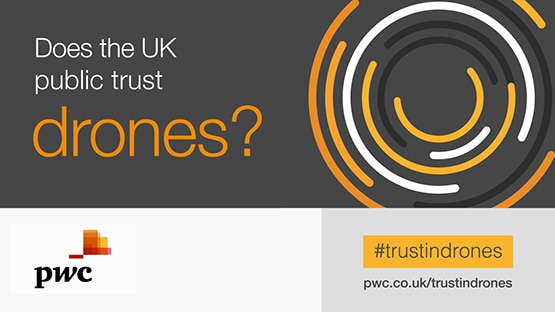
Contact us













